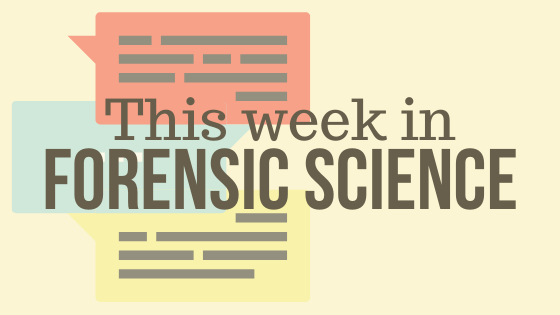No one has hours to scour the papers to keep up with the latest news, so we’ve curated the top news stories in the field of Forensic Science for this week. Here’s what you need to know to get out the door!
New Law in Virginia Removes Barrier to Proving Innocence (Forensic – 4/17/2020)
House Bill 974/Senate Bill 511, sponsored by Delegate Charniele Herring (D-Arlington) and Senator John Edwards (D-Roanoke) and signed by the Governor, removes restrictions in the writ of actual innocence law that have made it nearly impossible for wrongfully convicted people to obtain relief.
Some California Sex Assault Victims Collect Own Evidence Amid COVID-19 (Forensic – 4/17/2020)
Fears of getting infected with the coronavirus have prompted authorities in Northern California to allow some sexual assault victims to collect evidence with a nurse directing them in the hours-long process through a video call.
Possible Dinosaur DNA Has Been Found (Scientific American – 4/17/2020)
- New discoveries have raised the possibility of exploring dino genetics, but controversy surrounds the results
The Women Behind DNA Doe Project Inspire New Drama Series (Forensic – 4/20/2020)
The plots of Blood Relative will be inspired mostly by work done at DNA Doe Project, but also Fitzpatrick’s IdentiFinders International. Importantly, Fitzpatrick and Press will be consulting on the scripts to ensure the scientific accuracy of the show.
I Donated My DNA to Help Stop the Coronavirus (OneZero – 4/20/2020)
Will genetic volunteers be punished with discrimination, denial of medical insurance, and loss of employment opportunities?
New Program in Houston is Training Future Forensic Scientists and Digitizing DNA Evidence (InnovationMap – 4/21/2020)
Houston-area’s first-privately held forensic sequencing laboratory has partnered with The University of Texas M.D. Anderson Cancer Center to create an academic program that will provide forensic training to genome scientists that will help them crack previously unsolved criminal cases.
DNA Identifies Two Cold Case Victims in Florida (Forensic – 4/22/2020)
Decades after they were killed, two victims of two separate homicides in Volusia County have been identified thanks to DNA matches.
The cases of Howard “Kip” Evans, who was found dead in 1986, and Doris Regina Chavers, who was last seen alive in 1989, are no longer listed as Jane Doe and John Doe.
Othram Uses Forensic Genealogy to Help SEMO Anthropologist Identify Remains Found on a Missouri Farm in 1979 (DNASolves – 4/22/2020)
Othram, the leading forensic sequencing laboratory for law enforcement, is pleased to announce the identity of human remains found on a Charleston, Missouri farm in 1979. In Feb. 2020, Dr. Jennifer Bengston, Ph.D., Associate Professor from Southeast Missouri State University, partnered with the Othram laboratory and lead genealogists, Lee and Anthony Redgrave, to utilize the latest forensic genealogy technologies to help identify human remains held at the University as part of Dr. Bengtson’s anthropology program.
DNA Helps Sacramento Police Identify Suspect in Decades-Old Cold Case Homicide (FOX40 – 4/22/2020)
- family of 17-year-old Mary London has prayed for answers for nearly 40 years in order to finally know the identity of her suspected killer.
“The person that we’ve concluded was responsible for this was another young man around her, Mary’s, age that was murdered downtown in Sacramento a little over a year after he murdered Mary,” said Sacramento Police Chief Daniel Hahn.
Officials Announce World’s Oldest Cold Case Solved Using Genetic Genealogy in Colorado (FOX31 – 4/23/2020)
It has been almost 57 years since Margaret “Peggy” Beck, 16, was raped and killed at a Girl Scout camp in Jefferson County. DNA evidence led to an arrest warrant being issued.
James Raymond Taylor would be 80 years old now. He is being sought by the Jefferson County Sheriff’s Office on suspicion of sexual assault and murder.
Gdańsk Scientist Makes Crucial Headway in Understanding Killer Virus by Isolating Killer Virus by Isolating COVID-19 DNA from Infected Patient (THEfirstNEWS – 4/23/2020)
The full DNA sequence of the coronavirus virus has been taken from an infected patient after being isolated by scientists at Gdańsk University.
By unravelling the genetic sequence, the researchers can learn a variety of crucial information about the disease, such as how the virus ‘deceives’ the human body, weakening its immune system.
WOULD YOU LIKE TO SEE MORE ARTICLES LIKE THIS? SUBSCRIBE TO THE ISHI BLOG BELOW!
SUBSCRIBE NOW!


